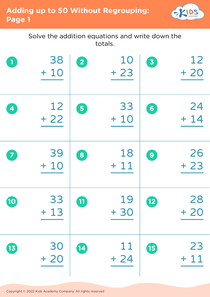Basic Addition Adding up to 50 with Regrouping Worksheets for Ages 3-8
3 filtered results
-
From - To
Unlock the joy of learning basic addition with our "Adding up to 50 with Regrouping Worksheets". Perfect for ages 3-8, these engaging printables help kids grasp addition concepts using fun and colorful designs. Through hands-on practice, children learn to add numbers up to 50, gaining confidence with regrouping techniques. Our worksheets blend education and play, ensuring a positive learning experience. From simple exercises to more challenging problems, these resources support young learners' math skills, preparing them for advanced arithmetic. Ideal for parents and teachers, these addition sheets make math exciting and accessible for little minds.
Understanding basic addition up to 50 with regrouping is essential for young children aged 3-8 as it forms the foundation for their mathematical development. Grasping this concept at an early age enhances their confidence in math, making future learning more accessible and enjoyable.
Firstly, adding up to 50 is a skill they will use daily, from counting toys to handling small amounts of money. Introducing regrouping (carrying over) enhances their problem-solving abilities and enables them to tackle larger numbers and more complex calculations as they progress.
Incorporating basic addition aids cognitive development. It involves critical thinking, memory, and the ability to follow multi-step procedures. Presenting these challenges early on prepares children for structured and logical thinking, which benefits various life aspects.
Teachers and parents can nurture positive attitudes towards math by making learning fun (using manipulatives or games) and by emphasizing its practical application. Establishing this positive relationship with math early on fosters lifelong numeracy skills, necessary for success in school and beyond.
Thus, caring about basic addition with regrouping is pivotal. It equips young children with necessary skills for academic achievements, encourages logical thinking, and lays down a strong foundation for their continued educational journey.
















